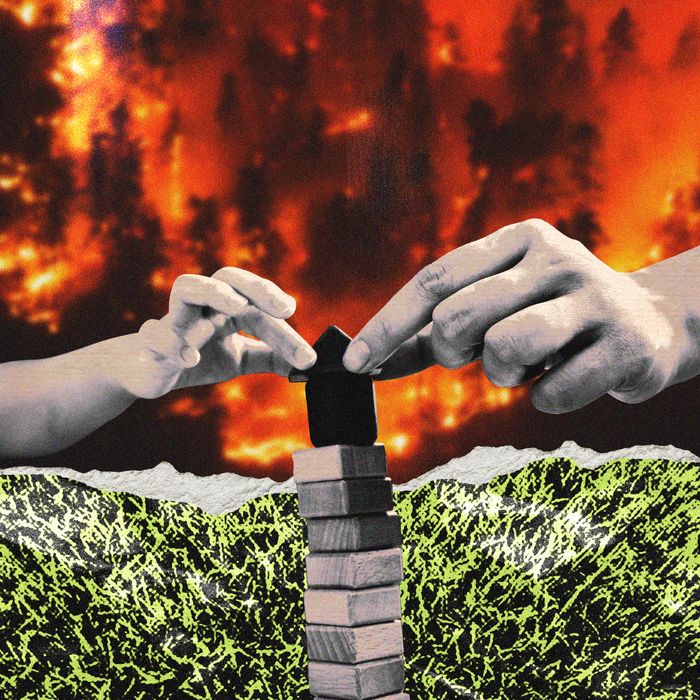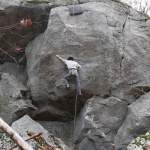
On a too-warm day in early spring, I was sitting at a sidewalk café in Williamsburg, having a catch-up coffee with a former colleague in her early 30s. She was wondering aloud about freezing her eggs. “But then again, most of my friends are pretty much resigned to never having kids, or are at least angsting about it,” she said. “You know, because of the stuff you’re working on.”
The stuff I’ve been working on, as a writer, is the climate crisis and how people are responding to it. And in the past decade, I’ve indeed heard an increasingly loud drumbeat of concern about procreation. Some people worry about the world their children will inherit; others feel guilty about the enlarged carbon footprint that comes with an enlarged family.
There have been personal essays, memoirs, metafictional novels, nonfiction books, documentary series, and podcasts on the topic. A few weeks ago, the writer Jessica Winter shared her own brush with procreation angst in The New Yorker. And research studies back up that this is a growing phenomenon. A recent meta-analysis from University College London found that across nearly every study on the topic, the more worried people were about the climate, the stronger their desire for fewer children or none at all.
As a mother of two, I have to confess that when I read these pieces or hear these arguments, it feels like a slap in the face.
I wanted to ask my friend: Where does this show of concern leave my kids, not to mention your nieces and nephews, and the hundreds of thousands of children being born into this potential hellscape every day? And what next? You plan to live out your life carefree, unbothered by what happens to the planet after 2060 because none of your DNA will be left on it? Isn’t that the solipsistic reasoning that got us into this dilemma in the first place? Or maybe what you’re saying is that you are basically another Dalai Lama, renouncing one of life’s greatest experiences for the sake of the manatees, while I, with my heedless, profligate, Amazon-warehouse-emptying brood, am like a guy scarfing an Arby’s Bacon Ranch Cheesesteak in front of a vegan.
But as I calmed down, a niggling thought — a splinter of doubt — wedged its way into my psyche: What justification is there for bringing children into a world like this?
I met climate mental-health researcher Britt Wray in 2019 at a panel discussion titled “Intimate Dilemmas in the Climate Crisis: Grief, Kids and Feelings About the Future.” I was just starting the internal journey that would eventually lead to quitting my education correspondent job to focus on climate.
I was disappointed to find that the panel was actually focused almost entirely on whether to parent, not how to parent, and on theoretical kids, not actual kids. Having already had my two kids, after years of exhausting and expensive infertility treatments, this conversation didn’t have a place for me. If I’m being honest, I felt shamed by it — like I should have woken up to climate change several years ago, before I made this huge, irrevocable life choice.
But in the four years since that talk, Wray has gone through a complicated, and at times, painful process of self-inquiry and research that resulted in a book, Generation Dread; a documentary shown on Canadian television, The Climate Baby Dilemma; and, finally, a now-2-year-old son. And having landed on the parenting side of the fence, she’s suffered blowback from her former fellow travelers, especially those who have been “doing more than just disclosing their distress over whether to parent, but organizing around that principle,” she says. This includes groups like BirthStrike for Climate, which is closely connected to the climate-protest movement Extinction Rebellion, and #NoFutureNoChildren, a pledge started by a Canadian teenager.
These people aren’t just struggling privately, but weaponizing their angst as a political threat, and they didn’t take kindly to Wray’s defection from the ranks. “I got this reaction mainly in online spaces with different climate activists,” Wray says. “Like, ‘Here’s another woman who’s gone through her climate grief and found a way to be radically hopeful. I’m tired of this false dichotomy.’” Others, including former collaborators, were outright offended by how the book and documentary present Wray’s choice to have a child: as a commitment to joy and a release from fear-based thinking. “They were like, How dare you?” she tells me. “I haven’t always been as skilled as I want to be in slicing my compassion for all the sides.”
All the women I talked to agreed that the enemy is not people who have children, or people who don’t have children. It’s the fossil-fuel industry. And yet, thousands of years into the patriarchy, humans somehow remain addicted to staging cultural battles on the bodies of women. No matter how sterling your intentions, if you declare a “birth strike,” or use your own reproductive potential as a signal flare to draw attention to the climate crisis, you are playing into a patriarchal dynamic and pointing your personal choices at a potential ally, maybe someone like me.
The hard truth is that, parent or no, there is no shirking your responsibility to build a better future. We are all ancestors. When Donald Trump was elected in 2016, Yessenia Funes, a climate writer, was in her early 20s. She thought she’d have to shelve her lifelong dream of becoming a mother, except perhaps by adoption. “Things felt really dark. It felt really irresponsible.” But she was already an aunt; her sister became a mother at 15. So she still felt connected to the next generation. Realizing she couldn’t slip the knot that ties her to the future, Funes has come around to the idea of having biological kids after all.
Elizabeth Cripps is a professional ethicist and mother of two who wrote a book called Parenting on Earth. The book’s main thrust is that in a world set to reach 1.5 degrees Celsius of warming and filled with threats and uncertainty, we need to rethink what we consider to be mainstream “good parenting,” which has often been defined as devoting our energy to cultivating our children’s skills and talents so they can be financially successful adults. But to prepare children only for a life of accumulating wealth and conspicuous consumption on a dying planet is about as smart as buying them a first-class cabin on the Titanic. “We need to move away from this idea that being a good parent is focused on individualistically buying them stuff or buying them advantages,” Cripps says. “I also owe my children a decent future in a much wider sense.” That means even busy, working parents should carve out time to work collectively, through activism and advocacy, for a just and flourishing planet for everyone, she says.
Cripps devoted a chapter of the book to the question of whether it’s okay to have children in the first place. Like me, she finds the question a little off-putting. “I feel great understanding for people who are [considering forgoing childbearing], and real compassion,” she says. At the same time, “There’s concern that it’s a little bit of a privileged position to have got to this stage in history and to begin going, Oh, actually, I’m deciding whether to have a child when I don’t know if they will be safe. This is a predicament that women of color and Indigenous women, for example, have been living with for so long.”
My friend Bhavreen Kandhari, who organizes fellow mothers to push for cleaner air in Delhi, agrees that climate-related reproductive reluctance is usually reserved for the privileged classes. “In a country like India, having children is a very big thing. If you don’t have children, it’s taboo. Three or four years back, the daughter of one of the leading politicians of my city said to me that they have decided not to have children: ‘I don’t want to live with that stress. I don’t see that this world is right for the children now.’ She was very concerned about the air pollution. I said, ‘Well, your dad should make it better for all the other children also.’”
Cripps observes that the question of whether to have children cuts to a moral quandary at the heart of the environmental movement: How much should we focus on individual choices versus collective action?
Kids, especially in the United States, consume a lot of resources. “If we look at personal impact on carbon emissions, [procreating] is going to be one of the biggest decisions we make as individuals,” she says. And for her, albeit not for every climate advocate, “Thinking about carbon footprints is important to bring about collective change and minimize our complicity,” she says.
The idea that being an ethical human today requires minimizing complicity, that is, viewing my way of life as an ongoing crime against the future, temporarily chilled me. But as an ethicist, Cripps also has to weigh the very real carbon impact of another SUV-riding, disposable-diaper-wearing American child against the grief that can arise from the unfulfilled desire to parent — suffering with which I personally became very familiar in my late 20s and early 30s.
“There is an open question about how much as individuals we can be asked to change our lives to cut carbon emissions when the system isn’t changing,” Cripps says. “For me personally — certainly not for all people — there would be a very high cost to giving up becoming a parent.”
Cripps has done the moral math, and she believes that forgoing parenting is too much of a sacrifice to ask individuals to make, as long as they really want kids. Of course, that conclusion isn’t much help for those who are still making up their minds.
To those people, I say: Having kids is both selfish and self-sacrificing, optimistic and fatalistic. Because children belong to their parents and to all of us, there is no future without them for anyone at all. Realizing you can’t guarantee your kids a safe and happy life is the hardest truth of becoming a parent. If you decide to have a child, you will see your love for that child is terrifyingly vast, big enough to hold the whole planet.
And if you decide not to have a child? I know your love for this fragile world will be no less great, and no less painful.




